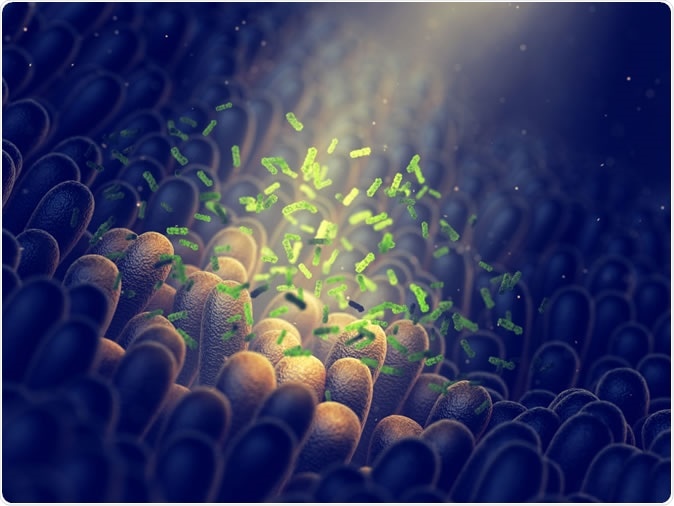Food could play a role in formation of the microbial flora within the human gut. This has been shown time and again in several studies and research. Now researchers from San Diego State University have shown that food could be used as a medicine to modulate the gut microbial flora and promote the growth of beneficial bacteria within the gut. They also noted that some of the food affects the gut microbes by raising the production of viruses called bacteriophages. These viruses can keep the harmful bacteria levels low while promoting the population of healthy bacteria. The new study was published today in the latest issue of the journal Gut Microbes.

Intestinal bacteria 3d illustration. Credit: nobeastsofierce / Shutterstovk
For this study the team thus identified several foods that could help raise the population of these bacteria-eating viruses and thus possess antimicrobial properties. The team looked at several types of foods and prepared a list of foods that could provide this benefit. Normally there is a growth of bacteria which reach a stable population level and the curve of growth plateaus, write the researchers. However, as the level of the viruses rose within the gut, the levels of the bacteria fell until they were completely eliminated from the gut.
Research associate Lance Boling worked on this as his thesis a few years back. He is the lead researcher and SDSU molecular biologist, on this new study as well. His thesis was titled, “Dietary Antimicrobials and Prophage Inducers - Towards Landscaping of the Human Gut Microbiome.” He explained, “The microbiome is composed of hundreds of different bacteria and the phages they host. We could actually tackle certain conditions by adjusting the foods we consume, that will affect microbial diversity which in turn will influence health and diseases.” He explained, “We also found some foods acted as phage inhibitors and could be used to control pathogenic viruses.”
Forest Rohwer, an SDSU microbial ecologist and pioneer of viromics research also said that this study was significant. He said, “This shows we could sculpt the human gut microbiome with common dietary compounds. The ability to kill specific bacteria, without affecting others, makes these compounds very interesting.” It was in Rohwer's lab that Boling worked on this new research. The researchers added that the gut microbes affect health in multiple ways, as has been seen from several studies. They explained that a healthy gut microbial flora can result in better metabolic health, improved maintenance of a healthy weight and digestion and also good cognitive abilities and preserve mood and prevent depression. Healthy gut microbial environment is also known to reduce the risk of cancers, heart disease, irritable bowel disease and diabetes. This study reveals that planning of diet can help modify the gut microbes and thus preserve good health.
Boling explained that when healthy foods they identified are exposed to the gut microbes, there is a rise in viruses such as bacteriophages. These viruses engulf bacteria and the viruses grow within the bacteria till they burst open. This causes exponential multiplication of the bacteria. Boling said, “There aren't many known chemical triggers, and we wanted to find these 'prophage' inducers - or what causes the phage DNA to detach and replicate.”
For this study they chose 117 food items or additives and plant products as potential candidates with antimicrobial properties. They chose two phyla of bacteria from the gut - Bacteroidetes and Firmicutes. These have multiple strains – some beneficial and some harmful. Some of the food items that can show such bacteria-killing benefits include honey, aspartame, stevia (plant-based sugar substitute), licorice, oregano, cinnamon, hot sauce, cloves, rhubarbs, neem extract and bear berry write the researchers. Bacteriaphage production was raised most with neem, aspartame, stevia and uva ursi or bear berry present in toothpastes, the team found. A total of 28 food items were found to have the antimicrobial properties. The team used flow cytometry – a highly sensitive technology to detect the viruses in the samples.
Boling explained his work saying that these food items can selectively allow certain bacteria to perish and others to flourish within the gut in a process, “akin to pulling weeds from a garden so that more desirable plants have room to grow”. He thus termed the process as “landscaping” the gut.
He and other experts warned that this whole process could be jeopardized when a person takes broad spectrum antibiotics. Similarly, certain foods when over consumed could end up killing many beneficial bacteria in the gut and ruin the biodiversity. Nevertheless, the uses of food based gut microbial manipulation is a growing science feel the researchers. Rohwer said, “We are excited about finding more prophage inducers and determining the molecular mechanisms by which they work. There are probably thousands of compounds that would be useful for eliminating unwanted bacteria.” Boling also concludes in his thesis, “These methods and results present novel tools toward the eventual manipulation of the human gut microbiome.”